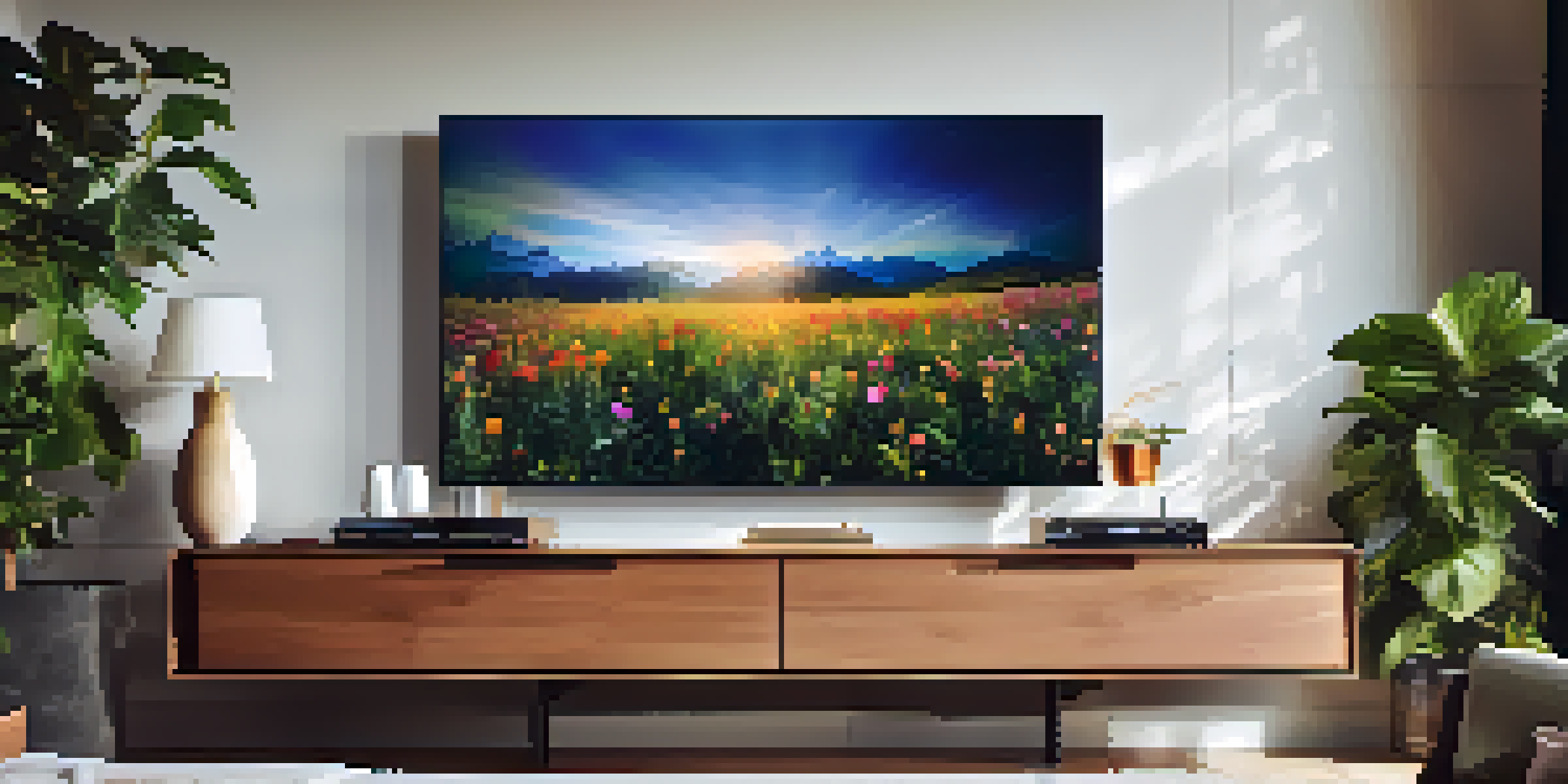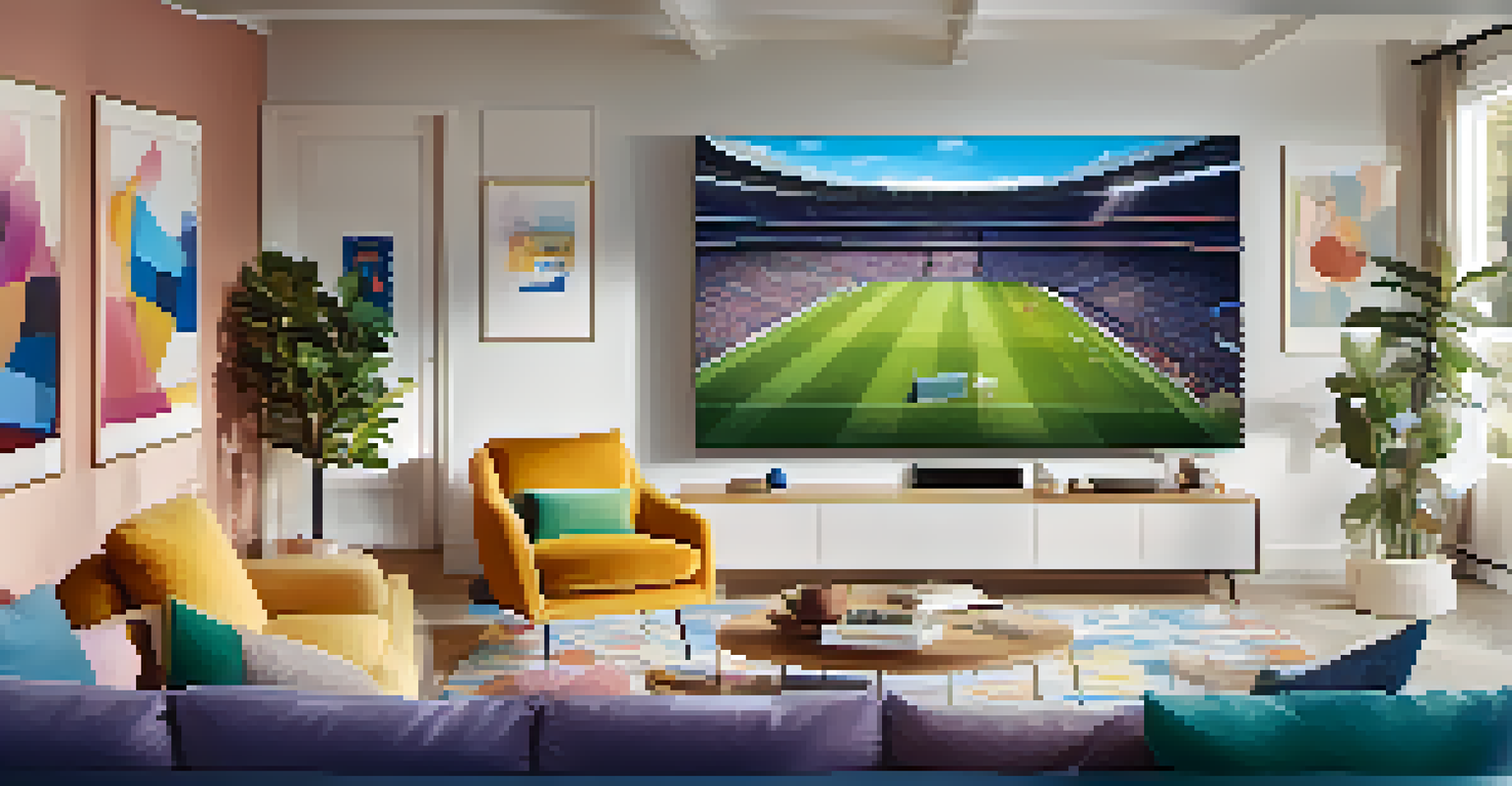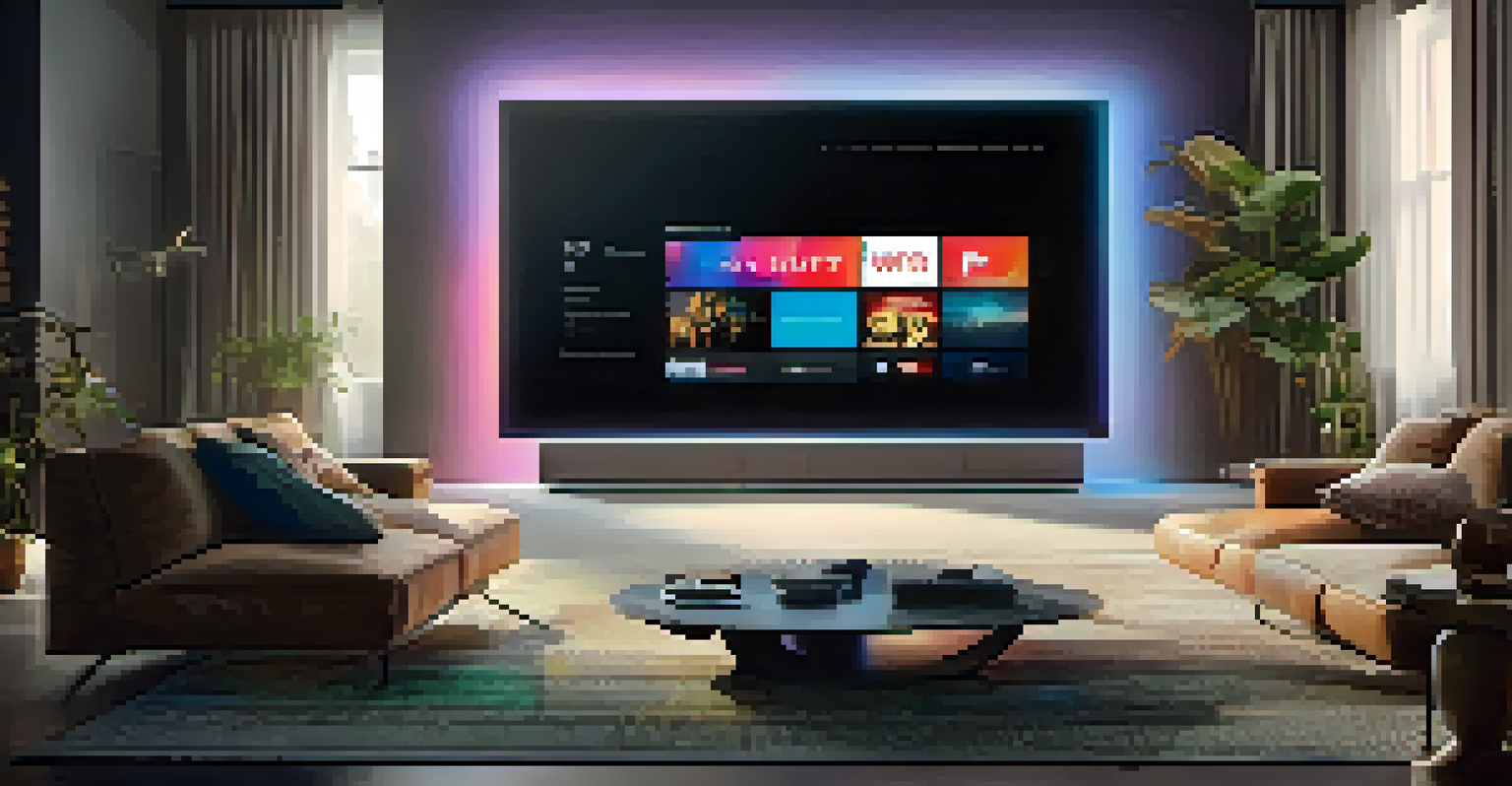Comparing OLED vs. QLED TVs for High-End Homes

Understanding OLED Technology for Stunning Visuals
OLED, or Organic Light Emitting Diode, is a technology that allows each pixel to emit its own light. This means that when a pixel is off, it produces true black, delivering stunning contrast and vivid colors. The result? A breathtaking picture quality that can truly transform your viewing experience.
The best TV is the one that fits your viewing habits and environment.
One of the standout features of OLED TVs is their ability to achieve incredible color accuracy. Imagine watching your favorite movie and feeling like you're part of the scene because the colors are so rich and lifelike. This makes OLED a favorite among cinephiles and anyone who values premium visual quality.
However, OLEDs are not without their downsides. They can be more expensive to produce and sometimes suffer from burn-in issues, where static images can leave a permanent mark on the screen. For high-end homeowners, weighing these pros and cons is essential in making the right choice.
Diving into QLED Technology for Brightness and Color
QLED, short for Quantum Dot Light Emitting Diode, utilizes a different approach by employing quantum dots to enhance brightness and color. This technology allows for a wider color spectrum and higher brightness levels, making it an excellent choice for well-lit rooms. Picture watching sports in the daytime without losing any detail—QLED excels in these conditions.

One of the advantages of QLED TVs is their longevity. They don't face the same burn-in risks as OLEDs, making them a safer choice for those who often leave static images on their screens. This durability is appealing for families or individuals who use their TVs for gaming or extended viewing.
OLED Delivers Unmatched Picture Quality
With its ability to produce true blacks and stunning contrast, OLED technology offers an exceptional viewing experience that is particularly appealing for movie enthusiasts.
However, while QLEDs shine in brightness, they may not reach the same level of black depth as OLEDs. This means that in darker scenes, the contrast might not be as pronounced, impacting the overall viewing experience. High-end buyers should consider their typical usage environment when weighing these factors.
Comparing Picture Quality: Which Is Better?
When it comes to picture quality, OLEDs often take the crown for their unparalleled contrast ratios and deep blacks. Imagine watching a thrilling horror movie where shadows play a crucial role; OLED's ability to display those dark tones flawlessly enhances the tension and atmosphere.
A good television is a doorway to the world, bringing stories to life like nothing else.
On the other hand, QLEDs offer superior brightness, making them ideal for watching movies or shows in bright rooms. Picture hosting a movie night with friends in a sunlit living room; a QLED TV will ensure that everyone can see the details without straining their eyes.
Ultimately, the decision may come down to personal preference and viewing habits. If you prioritize deep blacks and cinematic experiences, OLED may be your best bet. However, for those who enjoy vibrant colors and bright environments, QLED could be the way to go.
Design and Aesthetics: Making a Statement
In high-end homes, aesthetics matter just as much as performance. OLED TVs are often thinner and more stylish, seamlessly blending into modern decor. Their sleek design can enhance the elegance of a living space while providing a stunning visual experience.
QLED TVs, while slightly bulkier, also offer a variety of designs that cater to different tastes. Many brands provide customizable options, allowing homeowners to pick finishes that match their interior design. Imagine a large QLED screen framed beautifully against a wall—it can serve as both a functional and artistic piece.
QLED Excels in Bright Environments
QLED TVs shine with superior brightness and color vibrancy, making them ideal for well-lit rooms and dynamic viewing situations like sports or gaming.
Both technologies come with wall-mounting options, which is a fantastic way to save space and create a minimalist look. Ultimately, the choice may depend on personal style preferences and how well the TV complements your existing decor.
Price Comparison: Budgeting for Luxury
When shopping for high-end TVs, price can be a significant factor. Generally, OLEDs tend to be more expensive due to their advanced technology and manufacturing costs. If you're investing in an OLED, you're likely paying for that superior picture quality and design.
QLED TVs, while still considered premium, often come at a lower price point. This makes them an attractive choice for those who want high performance without breaking the bank. You might find that you can get a larger QLED screen for the same price as a smaller OLED, which is a consideration for larger living spaces.
It's essential to weigh the value you place on picture quality against your budget. Sometimes, spending a bit more on an OLED can be worth it for the viewing experience, while others may find that QLED offers the perfect balance of quality and affordability.
Viewing Experience: Immersive Entertainment
The viewing experience can differ greatly between OLED and QLED, depending on the content and environment. For movie lovers, OLED's superior contrast makes it a fantastic choice for immersive viewing, especially in dark settings. Picture yourself lost in a gripping drama where every detail draws you in.
Conversely, sports fans and gamers may prefer QLED’s brightness and color vibrancy. The ability to see every detail during fast-paced action is crucial for an engaging experience. Imagine the thrill of watching a live game with friends, where clarity enhances every moment.
Choose Based on Viewing Preferences
The decision between OLED and QLED ultimately depends on personal viewing habits, whether one prioritizes deep blacks for movies or brightness for everyday use.
Ultimately, the best choice will depend on your typical viewing habits. If you enjoy watching films in a dark room, OLED could provide a more captivating experience, while QLED might be more suited for lively gatherings or well-lit spaces.
Final Thoughts: Choosing the Right TV for You
In the end, the decision between OLED and QLED comes down to your personal preferences and viewing environment. If you prioritize picture quality, deep blacks, and a sleek design, OLED may be the perfect fit for your luxury home. It’s like choosing a fine wine that enhances your dining experience.
However, if you need a brighter screen for a well-lit room and value longevity without burn-in risks, QLED could be the ideal choice. Think of it as opting for a versatile, reliable companion that suits various occasions.

Whichever technology you choose, investing in a high-quality TV will undoubtedly elevate your home entertainment experience. So, take a moment to reflect on what matters most to you, and you'll find the perfect TV to complement your lifestyle.